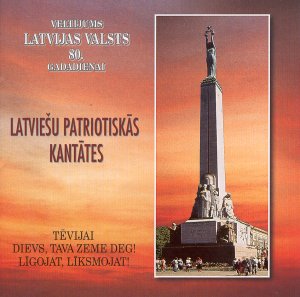The often secular and sometimes patriotic cantata is
a feature of Scandinavian music of the last century and the late-nineteenth.
Look at the examples in the worklists of Nielsen, Sibelius and Alfvén.
Many of the Sibelius works have been recorded (courtesy of Bis and Ondine)
but none have made it into the limelight. The Nielsen works will surely
rate recordings before too long.
The recordings were made in the 1980s after years when
the Soviet grip had made them proscribed works.
Jurjans was known as 'Jurjanu Andrejs' for much of
his life. A graduate of St Petersburg Conservatory he spent most of
his life teaching at the Karkhov Conservatory. He returned to Latvia
at the end of his life. He was the first Latvian composer of an orchestral
work - his 1888 Song Festival March. He also wrote the first
Latvian Cello Concerto - The Elegiac. There is a symphonic suite
Latvian Dances. He was a dedicated collector of Latvian folk
music.
Garuta was a pupil of Josep Vitols (himself a Rimsky
pupil). An accomplished pianist the first half of her professional life
was spent in the Eastern Bloc concert circuit. Illness terminated her
concertising and she turned to composition with many works to her name.
Her Piano Concerto (1952) is seemingly well worth a listen. Reportedly
her music has emotional expressivity and Scriabinesque volatility. Her
remarkable cantata, featured here, was written during World War 2. The
premiere in 1944 at Riga must have been an extraordinary event with
the composer at the organ and massed choirs conducted by Teodors Reiters.
The notes claim it as a work expressing terror, suffering and desperation.
It was banned by the Soviet authorities and on its candle-lit revival
in 1990 at the 20th Latvian Song Festival with tens of thousands of
singers produced a deeply moving effect.
Jurjans' To My Fatherland rings out with conviction
but cannot avoid bombast and that rather suffocating air of the national
anthem. Sing Rejoice is very catchy - lightly salted by the spirit
of liberation and joy. Beethoven's Choral Fantasia and Egmont
have some of the same quality. The enunciation of the Latvian Radio
Choir could hardly be bettered.
While it is fitting that the two short Jurjans' cantatas
are each allotted a single track it is a pity that the Garuta, which
weighs in at two minutes over three quarters of an hour is also allocated
just one track. It should have been subdivided.
The Garuta work is extremely imaginative and stirring
benefiting from the steady golden tone of Kamerkoris 'Ave Sol' [e.g.
38.24]. The introduction to the work flames with the same tempestuous
Old Testament aggression to be found in Havergal Brian's Siegeslied
Symphony, and in parts of Franz Schmidt's Book of the Seven Seals
and Rudolf Tobias's Jona Sendung. You may have heard the
extraordinary Tobias work in February 2002, broadcast from Paris and
also recorded on BIS (reviewed elsewhere on this site). Stormy rolling
organ squalls goad the choir onto new assaults on the heavens. The ructions
and protest are offset by many hushed devotional reflections - mostly
invocational or prayer-like. Nobility and suffering seem to suffuse
many of the solos including Sprogis's fine aria at 30.32.
The notes are by Professor Olgerts Gravitis and I apologise
to him for leaning so heavily on his notes. These are in Latvian and
English. The sung texts are not printed in either language - a pity.
Fervent and spiritual singing with only the To My
Fatherland ringing bombastically hollow. The Garuta is an especially
imaginative work punching well above the usual patriotic weight.
Rob Barnett
AVAILABILITY
www.balticshop.com


